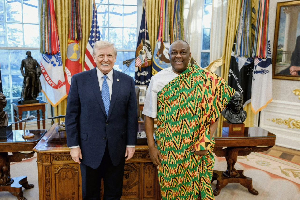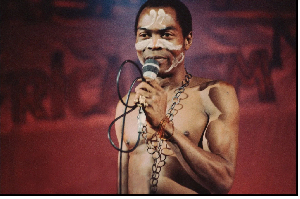DI Reacts to David Kanga's comments
Article by Gabby Asare Otchere-Darko
Recent statements by a Deputy Chairman of the Electoral Commission (EC), Mr David Adenze Kanga, only adds to the confusion on what the Electoral Commission sees as the way forward to significantly enhancing the integrity of Ghana's electoral system which was perilously tested in the December 2008 general elections.
During the workshop organised by the Institute of Economic Affairs (IEA) for some selected civil society organisations, leaders of political parties, religious leaders, journalists and development partners on the theme, "The survival of multi-party democracy and politics of accommodation and tolerance", Mr Kanga expressed, what we see as a very worrying scepticism about the viability of Ghana adopting a biometric voter registration system and an electronic voting system.
The Daily Graphic of Thursday, 15 October read: "Regarding the biometric system of registration and voting, Mr Kanga said the country should tread cautiously concerning voting, in order not to throw off the transparency tenets in the present voting system."
He explained that with the electronic voting, the electorate would be given receipts from the machine indicating that they had voted and after the process the machine would indicate how many votes each candidate received. With this process against the backdrop of the fact that the Ghanaian electorate was accustomed to the counting of ballots in their presence, the ordinary voter would not appreciate how the machine arrived at the final figures for each candidate.
Such selective comments do not inform the public fully on the respective weight that should be put on the pros and cons of both electronic voting and paper balloting. It is with this in mind that the Danquah Institute is holding a seminar on December 7, 2009 exclusively devoted to the viability of adopting a biometric voter register and/or electronic voting for Ghana in 2012. The purpose of the conference is to interrogate deeper the issues and concerns about e-voting. (DI will hold a press conference on Monday, 1 November on its 'National Conference on the Viability of Electronic Voting in Ghana').
The sum total of international research shows that e-voting offers potential for voting and election management that is an improvement over ballot paper voting or non-biometric voter registration. For Ghana, that technological leap could be the defence weapon against the explosion of electoral violence in the future, which could ultimately deal a fatal blow to the entire democratic experiment here in Ghana with continental consequences.
On Tuesday, 12 May, a forum was organised by the Electoral Commission in collaboration with KAB Governance Consult and the Canadian International Development Agency (CIDA), under the theme "Safeguarding the Integrity of the Ballot Project". What could only be described as a historical commitment was made that day. At the Akosombo gathering, Ghana's main political parties endorsed the adoption of a Biometric Voter Register as the best way to guarantee a credible database of eligible voters. In a communiqué, all the seven political parties (including NDC, NPP, CPP, PNC and DFP) in attendance, in their endorsement stated: "This is very necessary to deal authoritatively with practices of multiple voting and impersonation that tend to undermine public confidence in declared election results."
Ref: http://news.myjoyonline.com/politics/200905/30029.asp.
There is a very strong case for biometric-based credentialing solution for Ghana's Voter Registration Project. Not long after the 2008 elections, the Danquah Institute started to advocate for the consideration of e-voting. Shortly afterwards, the Chairman of Ghana's Electoral Commission, Dr. Kwadwo Afari-Gyan, stated that the EC was looking to adopt a biometric system of registering voters prior to the next polls, but will stop short of implementing electronic voting for election day.
Delivering the CDD-Ghana 5th Kronti ne Akwamu lecture on 'The Challenges to Conducting Free and Fair Elections in Emerging African Democracies: The Case of Ghana.', Dr Afari-Gyan stated in response to a question by this author, the Executive Director of the Danquah Institute: "The Commission is considering biometric registration of voters but as for biometric voting, I don't think the country is ready for it. If we do, I believe some people will start asking whether the Castle has not programmed the machines with some figures to their advantage."
Again, on Wednesday, 18 March, 2009, Dr. Afari-Gyan announced on radio that a completely new voter registration exercise will take place to compile a new credible database for the 2012 general elections. The exercise will employ the best of technologies, including the use of biometric registration to beat fraudsters who attempt to exploit the voting exercise to their advantage. Dr. Afari-Gyan was the guest of Kojo Oppong-Nkrumah on Joy FM's Super Morning Show. Conceding that Ghana was lagging behind in the use of technologies in the electoral process, he said any new improvements in the system will have to include the best technologies, including biometric systems that will beat the fraudsters. See and listen via: http://news.myjoyonline.com/politics/200903/27689.asp.
We cannot, as a nation, dismiss without the benefit of a full domestic interrogation the viability of electronic voting. Just as allegations such as the EC conspiring with the incumbent government in 2008 to rig the elections did not perturb the Commission, so should we not allow predictable allegations such as "the Castle programming the machines" to stop us from considering the suitability of that option. Ghana has developed a matured tradition of post-elections self-assessment, which often leads to the introduction of enhanced security features to the electoral system, for example, transparent ballot boxes in 1996, and photo voter IDs in 2000. Surely, this is not the time to sidestep that tradition.
Though, there is talk of biometric voter registration or electronic voting as possibly the way forward, this prospect is being allowed to be easily shot down by the cynics because we are yet to devote enough intellectual resources to seriously interrogate this modern system of voting and its viability in Ghana. The fundamental question to be addressed before 2012 is how do we protect the integrity of the elections from the point of voter registration to the moment of winner certification? Linked to this is the question, what are the factors that influence public confidence in elections?
In 2008, both the rulling New Patriotic Party (NPP) and main opposition National Democratic Congress (NDC), at the time, accused each other of encouraging non-citizens, ghost names, as well as underage Ghanaians to register ahead of the elections. Speculations about and evidence of a bloated voter register went very far to undermine the credibility of the December vote. The possibility of a bloated register also fed steroids to the macho men of electoral fraud and violence, since a bloated voter register allows the opportunity to add up numbers and intimidate your opponents, ironically even as a defence strategy against an assumed threat of fraud against the intimidator's political party.
In the words of Dr. Afari Gyan concerning Ghana's 2008 voters' register:
"If our population is indeed 22 million, then perhaps 13 million people on our register would be statistically unacceptable by world standards. If that is the case, then it may mean that there is something wrong with our register."
Political parties exploited public admission and knowledge of a bloated voter register to feed their fears and trumpet allegations that there was a plot by a particular party or between an opposing party and electoral officers to rig the December polls. This gained legitimacy in the minds of several Ghanaians, including, perhaps, most dangerously some members in the security agencies. Thus, the 'battlefield' for a possible rejection of the results had been provided. We cannot as a nation continue with the undemocratic phenomenon where the balance of victory in our elections will be determined by how well a political party thinks it can manipulate results in its electoral strongholds.
The EC is yet to explain to Ghanaians how come after four previous presidential elections, 2008 registered the highest number of spoilt ballots (in both percentages and actual numbers), when the same system was used last year. With an election that less than 40,000 votes decided who swore the presidential oath on January 7, having over 200,000 spoilt ballots deserves more than a cursory comment. There is no such thing anywhere in the world as perfect election arrangement, but it has been shown elsewhere that electronic voting stops ballot box stuffing, ballot box theft and destruction, multiple voting, reduces spoilt ballots to zero, and saves the EC in printing, storage, staff costs, etc. Some jurisdictions have even maintained paper ballot in addition to electronic voting to serve as a counter-check in case of a dispute, thereby responding adequately to the very concerns raised by Mr. Kanga above. It is worth examining all the various options of e-voting, their security and usability features and their cost-benefit dimensions in order to make a responsible and informed decision on the way forward for Ghana's electoral process.
In Ghana's volatile and charged partisan political environment, it is extremely important that we have a trusted election process, where elections will be regarded as reasonably fair, even by the losing side. If India, with more illiterates than the entire population of Ghana, with 714 million registered voters, 828,000 polling stations, and many polling stations in areas with no electricity, could deploy one million battery-powered Electronic Voting Machines (EVMs) for an election with more than 100 political parties and not register any notable voice of protest, then Ghana would do herself a great disservice by refusing to constructively examine the viability of an electronic electoral process.
The spectre of hundreds of very angry young men wielding cutlasses at the vicinity of the EC headquarters last December should at least remind us of how close Ghana got to become another Kenya instead of the black star of hope that it is today that Africa can indeed hold 'normal' general elections. The platform on which Ghana has been receiving global applause for its performance at the theatre of elections is fragile. We need not allow our weaknesses to be deafened by the din of global praise. We must get to work now and tighten the nuts and bolts of our electoral process. E-voting may well turn out to be the best way to securing the future of Africa's fledgling democracies and, if so, Ghana should not miss this self-serving opportunity to once again blaze the continental trail.
The author is the Executive Director of the Danquah Institute, a liberal think tank.
Contact: gabby@danquahinstitute.org
No. 3 Dadebu Close, Dadebu Road, Nyaniba Estates.
Tel: 021-782878, Fax: 021-782906
Email: info@danquahinstitute.org Website: www.danquahinstitute.org
Opinions of Monday, 19 October 2009
Columnist: Otchere-Darko, Gabby Asare














